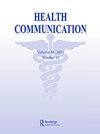Wellness Misinformation on Social Media: A Systematic Review Using Social Cognitive Theory.
IF 2.7
3区 医学
Q1 COMMUNICATION
引用次数: 0
Abstract
This systematic review examines how wellness misinformation spreads on social media and identifies counter-strategies through the lens of social cognitive theory (SCT). Analyzing 39 studies from 2019-2024, it highlights key SCT themes - observational learning, self-efficacy, and self-regulation - as central to user behavior. Influencers and algorithm-driven content amplify unverified health claims, especially on platforms like TikTok and Twitter. Effective countermeasures include media literacy, transparent influencer disclosures, algorithmic reforms, and SCT-informed educational interventions to enhance digital health resilience.
社交媒体上的健康错误信息:使用社会认知理论的系统回顾。
本系统综述研究了健康错误信息如何在社交媒体上传播,并通过社会认知理论(SCT)的视角确定了应对策略。该报告分析了2019年至2024年的39项研究,强调了SCT的关键主题——观察学习、自我效能和自我调节——是用户行为的核心。网红和算法驱动的内容放大了未经验证的健康声明,尤其是在TikTok和Twitter等平台上。有效的对策包括媒体素养、透明的影响者披露、算法改革和基于sct的教育干预措施,以增强数字健康复原力。
本文章由计算机程序翻译,如有差异,请以英文原文为准。
求助全文
约1分钟内获得全文
求助全文
来源期刊

Health Communication
Multiple-
CiteScore
8.20
自引率
10.30%
发文量
184
期刊介绍:
As an outlet for scholarly intercourse between medical and social sciences, this noteworthy journal seeks to improve practical communication between caregivers and patients and between institutions and the public. Outstanding editorial board members and contributors from both medical and social science arenas collaborate to meet the challenges inherent in this goal. Although most inclusions are data-based, the journal also publishes pedagogical, methodological, theoretical, and applied articles using both quantitative or qualitative methods.
 求助内容:
求助内容: 应助结果提醒方式:
应助结果提醒方式:


